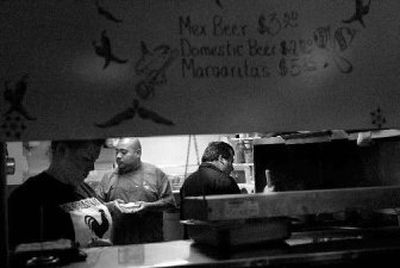SNAP energizes businesses too

When the Martinez family members wanted to transform their taco concession into a sit-down restaurant, they got business advice and financing from a nonprofit that’s best known for providing energy assistance.
Spokane Neighborhood Action Programs, which serves the low-income, has a microenterprise program that provides the education, loans and support necessary for entrepreneurs of low-to-moderate incomes to realize their dreams of owning, enhancing and expanding businesses.
“The good thing about them is they help you from all kinds of angles,” said Cesar Martinez, a 28-year-old who started El Gallo Giro, a 50-seat restaurant at 3207 E. Sprague Ave., with his wife, brother and parents.
MicroEnterprise Development operates under SNAP’s Neighborhood Assets Program, which provides financial and lending services for people with credit and income challenges.
Neighborhood Assets recently received the designation of Community Development Financial Institution from the U.S. Department of Treasury, said Dave Heyamoto, business development manager for SNAP.
Being a CDFI enables the agency to operate as a subsidiary of SNAP and expand financial services while continuing the focus on low-to-moderate incomes, he said.
“The whole objective is to help move them out of the situation they’re in and into a more stable, mainstream financial situation,” Heyamoto explained.
Since its inception 10 years ago, the microenterprise program has made about $700,000 in loans to cover start-up costs for 110 businesses employing five or fewer people.
The agency does cross-referrals with AHANA and SNEDA, two other community economic development agencies that serve a different range of clients. The Community Colleges of Spokane’s Small Business Development Center helps with follow visits and evaluations.
Heyamoto said over the years, MicroEnterprise Development has provided anywhere from hundreds to thousands of dollars for cosmeticians, long-haul truckers, janitors, restaurateurs, small manufacturers and other entrepreneurs.
SNAP representatives work with clients to build solid business plans and remove barriers to obtaining loans. Sometimes that means helping people clear up past credit issues.
“Often when people come in and talk with us about starting a business they have some type of issue they need to resolve,” Heyamoto said.
Martinez said he took a class to improve his personal credit and then took other courses to gain advertising and budgeting skills that would benefit the restaurant. Because the family had a solid business plan and had already successfully operated a smaller operation they were able to qualify for a $10,000 loan through SNAP.
In November, El Gallo Giro opened.
“Right now it’s starting to pick up a lot. Like any business, there are good days and bad days,” Martinez said, adding that SNAP representatives regularly stop by or call to offer support.
Heyamoto, who comes to the agency with 35 years of experience in marketing and business development with Avista Utilities, said the agency offers loans at about 1 percent to 3 percent over the prime interest rate. Loans can vary from $500 to $25,000 and take anywhere form one to five years to repay, he said
The program serves people who might not qualify for loans through traditional banks, he said.
“SNAP has more flexibility in granting credit than banks would,” he explained.
Loans come from a pool of money funded by government grants. Numerica Credit Union has joined with SNAP to provide additional or collaborative loans.
Although no statistics on success rates are available, Heyamoto said this fall Whitworth University will help research the status of the companies.
Last fall, Dennis Held and his wife Connie Grove opened Area 58, an antique and fine art store at 3036 N. Monroe St. So far the small business is breaking even, said Held, a 49-year-old college professor who teaches at Eastern Washington University and at Community Colleges of Spokane.
Held and Grove, an artist, knew they wanted to open a store that focused on locally produced art, so when a friend mentioned the MicroEnterprise program they contacted the agency.
“The whole SNAP experience is very community-organization minded. It’s not the usual bureaucracy. It’s not the usual big guys in suits shaking their heads no,” Held said.
The shop features rotating exhibits by local artists, he said, adding, “I think Spokane has a lot more dedicated and lifelong artists than there is space to display their work.”
SNAP representatives helped the couple put together a business plan, opening the door for an $18,000 business loan, Held said.
When the store’s accounting got more complicated, SNAP recommended a bookkeeper who charged them less than the going rate.
“We keep going back to them. It’s not just a loan, it’s a program,” Held said, adding, “They’re a magic organization.”